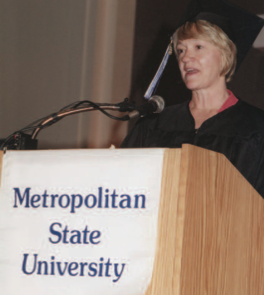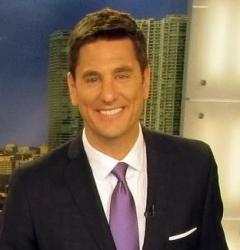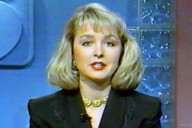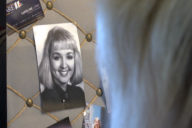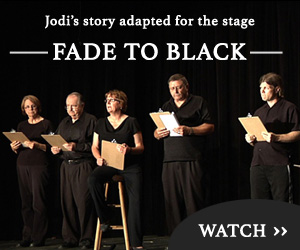Metropolitan State University Buzz | By Vicki Lofquist
Caroline Lowe has been called one of the greatest reporters the Twin Cities has ever known.* We call her our Alumna of the Year. A long- time television news reporter, Lowe has also been a community faculty member at Metropolitan State and she serves on the Alumni Board. She’s won a bevy of prestigious local, regional and national awards for her work on the crime beat. With more than three decades as a Twin Cities reporter at WCCO-TV behind her, she left Minnesota at the end of the snowy winter of 2011 and started work at KSBY-TV in San Luis Obispo, Calif. She spoke with Alumni Relations Director Vicki Lofquist.
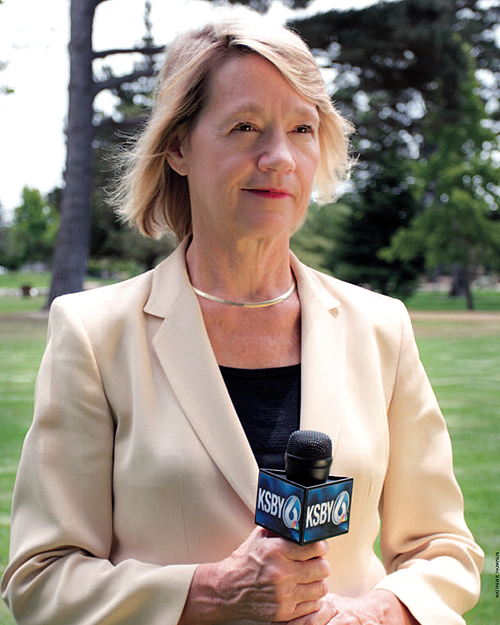
Caroline Lowe now manages KSBY-TV’s Santa Barbara County newsroom and reports for the station a few times each week.
What work did you do at WCCO?
I started as a newsroom librarian and worked my way up to reporter. I was a reporter for about 32 years, mostly working on the crime beat. I developed an interest in the crime beat while working in WCCO’s Saint Paul Bureau, where I developed a lot of cop sources and relationships with victims. I truly believe being a reporter was my “calling,” and I still feel a passion when I am covering a story.
How long have you been at KSBY-TV?
Since May 2011. On March 15, 2012, I marked 35 years in journalism. One of the things I tell young people is that you “have to go to grow” and it took me 34 years to do that. I think it’s really good to try a new adventure, and that’s what I’m doing now.
What’s your current position?
I manage KSBY-TV’s Santa Barbara County newsroom. I also report on the air about once or twice a week. I still cover the crime beat and breaking news, but my main role is assigning, mentoring and supervising our reporters and photographers in the newsroom.
Some stories I’ve done in recent months include a deadly Amtrak/car wreck that killed a young father and his baby daughter, a controversial shooting of a Santa Maria police officer by another officer, and a crash on a freeway bridge where a truck driver was killed and a young mom and two young children were stuck in a car that dangled over the bridge for a couple of hours. The officer shooting and the bridge crash made national news.
Has there been a story that’s been the most important to you personally?
It’s hard to pick just one story out of the thousands I have covered, but several have stayed with me including the unsolved abduction of Jacob Wetterling and the kidnapping of anchorwoman Jodi Huisentruit. I’d love to come back to Minnesota and do follow-ups on those stories, to finally answer what happened to Jacob and Jodi. There was also the “Missing the Beat” I-Team series on a downtown Minneapolis foot patrol. That series helped the community because changes to the beat were made in response to it, and it earned a duPont Columbia award. The murder of six-year-old Cassie Hansen on Nov. 10, 1981, in Saint Paul is also one I will never forget—I have her photo, along with photos of Jacob and Jodi, on my victims’ wall at my desk in Santa Maria. I am passionate about covering cold cases and hope to carve that out as my niche at KSBY as I did in Minnesota.
You were in the middle of a successful career when you came to Metropolitan State. Why did you decide to come back to college?
I didn’t need a degree to advance professionally at WCCO, but it always bothered me that I hadn’t completed college. It was “unfinished business.” For many years I had thought about going back to school for my degree. I finally took the step to sign up for a class after a rookie in a Minneapolis Police Department academy class where I was a guest speaker peppered me with questions about my qualifications to be on the crime beat. One class led to another, and I ended up getting my bachelor’s degree in law enforcement. One of my messages to people is that it’s never too late—whether it’s trying an adventure like a new job in California or going back
to school.
How did your degree change you?
Earning my degree gave me the know-how, critical thinking skills and confidence to do a better job as a journalist. It opened new doors professionally, including the opportunity to teach. Mensah Adinkrah was my first professor at Metropolitan State and he was awesome. I really got excited about being back in the classroom. After graduating in May 2002, I immediately moved on to graduate school at the University of St. Thomas where I earned a master’s degree in police leadership. I then returned to the classroom as a community faculty member at Metropolitan State. I love teaching and hope to have that opportunity again in California after becoming more established at KSBY.
After college I also earned a Minnesota Police Officer’s license and worked as a foot patrol officer with the Minnesota State Fair Police Department for eight summers—taking leaves of absence from WCCO. This was a great chance to get hands-on experience as a cop, even though it was in small doses.
My education at Metropolitan State, combined with my master’s degree and experience as a licensed police officer, has helped me enormously in covering crime and the criminal justice system. I learned to ask better questions when covering an officer−involved shooting, a police chase or a violent crime investigation. The more informed you are, the more credible you are with your interview subjects and with the community you serve. I don’t think other crime reporters need to go to the extreme of becoming licensed cops, but I do think more of them should take criminal justice classes so they have a better grasp of the system and can do better research as reporters.
If this were possible, what advice would you give to your younger self?
My advice to my younger self would be to always make one more call to make sure something is accurate, to make sure that nothing new has developed on a story. I’d like to tell young reporters not to get discouraged by the way the economics of our profession have changed, which has led to big cuts in staffing, resources and so on. It is still so rewarding to have a front row seat to so many events in our community, and it’s a terrific opportunity to make the communities we serve better informed.
*“CAROLINE LOWE 2.0,” MPLS.STPAUL, AUGUST 2011

